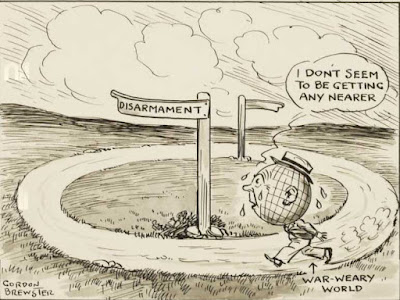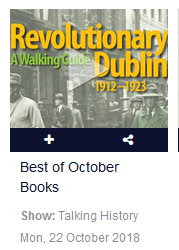I was remarking recently that some of Gordon Brewster's cartoons are timeless, in the sense that they deal with issues which are still with us in one way or another. So I thought I'd fish out just a few and relate them to modern times.
This is one of my favourites. He depicts himself as a street artist who is gratefully accepting a philanthropic donation on behalf of the arts community. He features himself in many of his cartoons and he gives us a clue here by putting his signature not on the cartoon itself but on one of the artist's street cartoons. If I ever write a book on Brewster this will be on the cover.
As to the timelessness: the arts community is still living a life of precariousness, now I understand rendered as precarity.
War
The title of this cartoon is "Careless Keepers". Wars don't just happen. Conditions have to be just right for the catalyst to trigger the war. It is usually a matter of chickens coming home to roost.
So the emphasis needs to be on the quality of the peace. You only need to think of the Treaty of Versailles and reparations (alluded to below), of modern resource wars (also mentioned below) such as, in our own time, the invasion of Iraq and the subsquent destabilisation of the Middle East.
Anticipating Brexit
The 1920s, to which period these cartoons refer, was a time when much of the world was reorganising itself after WWI. In Ireland this period saw the foundation and consolidation of the Irish State following the 1916 Rising and its aftermath, the War of Independence and the Civil War.
Then, Northern Ireland was to prove a running sore, and even today it is now at the heart of Brexit, with the backstop (or what's left of it) serving as a proxy for Britain's own self doubts and political complacency.
The South always maintained that Northern Ireland was a failed state, though the degree to which this was stated in public depended on the times and the speaker.
The cartoon above is hitting at the North's dependence on British handouts which were discreetly channeled through the Northern Ireland Unemployment Insurance Fund.
Despite all that has happened in the meantime, including the North's evolution to semi-detached status via the Belfast Agreement, the British are falling over themselves attempting to ignore it in the context of Brexit.
We in the South, are very well aware of the length and porous nature of the Border. We are also very aware of how invisible it has become over the last twenty years. Its physical resurrection as a result of Brexit carries enormous dangers, not just paramilitary but economic.
Just as the UK has enmeshed itself in the EU over the years, the North and the South have participated in seamless economic activity across the whole island, faciliated by common membership of the EU.
The cartoon above, implicitly poses the question of how this particular border crossing is to be managed after Brexit. Will you need your passport to come down for your breakfast in the morning or to retire at night after a hard days work?
Post Brexit deals?
Dr. Liameen Fox, and his successors, had his eye on China for post Brexit mega-deals. Even as early as 1926, the date of the above cartoon, UK gunboat diplomacy was on the wane and an object of universal mockery.
Just as Britain had not come to terms with its post WWI status, today she foolishly casts herself as a siren of trade desired by all and sundry.
A British raiding party? No doubt many surprises in store, then as now. This cartoon was just prior to the surrender by the British of the Hankow concession back to China.
Reminds me of the Hong Kong handover in June 1997. I was there a few months later and was struck by constant references by the Chinese to Hong-Kong-China, never Hong Kong on its own.
This one is so self-explanatory as to not need any comment from me.
I know this relates to Ireland but I couldn't resist its inclusion with USA and a wall. Anyway, the Brits have been viewing the USA market as one of their post brexit trump cards or ace in the hole.
Exploitation overseas
I really love this one. It could do with a rerun today with the topicality of the Amritsar massacre.
Brewsters own note to the cartoon is a lot more restrained than mine would have been:
Notes: "Gandhi is said to be coming to the Round Table Conference with a bill for £1,200,000,000 which goes back to the days of Queen Elizabeth when The East India Company first exploited the Uahatmas ancesters. The bill includes, over-taxation, illegal charges, and interest".
I can't remember which of George Bush's sidekicks, or was it Nixon's Kissinger, who referred to "our oil under their land" with the implication that some action should be taken to repair the Divine Creator's cock up.
Former Ambassador Craig Murray's recent blog post sets an even later context.
The cartoon goes all the way back to 1927.
Election Promises
This one and the next one really don't need any comment from me.
Taxation
This is from 1931 and Brewster notes:
"The taxpayer can always appeal to a higher official for redress if some lowly servant of the state treats him with discourtesy, or makes an error in calculating the cost of service rendered, but one cannot argue with an automatic machine. (The British Government has discovered that labour-saving machines are an economy)."
For "mechanised" substitute "computerised" and we're bang up to date. Though I have to say here that Revenue were leaders at the cutting edge of digital services and they went out of their way to make the final product as comprehensible and user-friendly as possible.
This still remains the case - the coflicting views of the Government and the ordinary taxpayer on the latter's taxable capacity.
Reparations/Debts
This cartoon from 1932 refers to German WWI reparations.
Brewster notes:
Regarding Dr Bruening's declaration on the cessation of Germany's reparations payments, our Berlin Correspondent states "circumstantial evidence indicates a firm conviction in both the German Government and the German people that reparations are dead and done with".Reparations were imposed by the "winners". Today the "winners" walk away leaving enduring genetic legacies from toxic chemical and radioactive weaponry behind them and nobody blinks an eye.
Then there are the war debts of the "winners". Brewster notes:
"The American Secretary of States reply to the British Note on War Debt payments leaves the matter very much where it was".It would remind you of the recent financial meltdown and how the burden of "Irish" debt was left with the Irish.
Fascism
This is from 1930 when the Nazis became the second largest party in the German Reichstag (parliament). Just a few years later Hitler was in control of Germany.
How easy it can happen even in a democratic state.
Is the West heading that way with examples like Trump in USA, and the Brexit-fixated and incompetent Boris & Co in the UK, all sponsored by big money & foreign powers.
I'm not posing exact equivalence, just pointing out the frailty of the system.
Disarmament
Comment here is superfluous.
Tory Party
And so back to Brexit. This cartoon has many resonances. While originally a comment on the Tory Party's reaction to the formation of a new Empire Party in 1930, it could serve as Gordon's advice today to stop messing about and hand over to someone who knows what they are at and what would be best for UK, Ireland and the EU.
Sadly, Brexit has happened. All that's left, for now, is the length of the transition and the shape of the new deal. And the signs are that the Tories are digging in.




















































